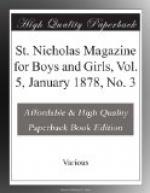He had seen all sorts of strange things among his poor people. He had seen some who seemed to prefer to be poor; he had seen others who had been rich, but who appeared to be happier now than when they had plenty of money,—and perhaps plenty of anxiety with it; he had seen others who were poor and did not know it; but this was the first time that he had ever seen any one of them offer him bread or anything else to eat. No wonder he was surprised when this old woman held out to him the loaf of bread!
She did not wait for him to ask her what she meant, but immediately commenced to explain. She told him that she and her sick old husband were among those to whom he had ordered food to be furnished, but that for some time all that his agents had given them was bread such as the loaf in her hand; bread so hard that it was almost impossible for old people to eat it, and yet they must eat it or starve.
The king listened with attention to her story, and then he took the loaf in his hands, and broke off a small piece of it.
“It is rather hard bread,” he said, thoughtfully, while his attendants bent over to look at it, as if it were a matter of the greatest interest to them, although it is probable that they did not care a snap of their fingers whether or not the old woman ever had any bread.
“Yes,” said the king, “it is hard bread.” And then he stood thinking about it. The old woman thought he was thinking of the trouble she and her husband had in eating it, but she was very much mistaken.
He was thinking that he had ordered that these people be well fed; that he had supplied the money to buy them good and nourishing food. Now, if his poor pensioners received nothing but dry bread, and very stale, hard bread at that, while he paid for good food for them, somebody must be making money out of him, to whom he had no idea of being charitable in this way.
Therefore he thought that if he wanted a thing well done, he must do it himself, or see it done. In this case he determined to see it done.
He went into the old woman’s house, and he talked to her sick husband and herself, and examined into their condition. The old people thought he was very good to say so much about their hard fare, and so he was; but if they could have heard what he said afterward to his dishonest agents, when he went home to his palace, they might have been surprised to know what an important thing a piece of hard bread may sometimes become.
And they might have thought, too, that it was a good thing for them, as well as for other poor people, that their bread had been so very hard that they were forced to complain of it to the king.
DISCONTENTED POLLY.
Polly ought to have been a very happy little girl, but she was not, because she hadn’t a doll. She had everything else: a beautiful kitchen, a stove with everything to use on it, some pretty china dishes, a table to put them on, and a neat little wicker chair to match the table.




